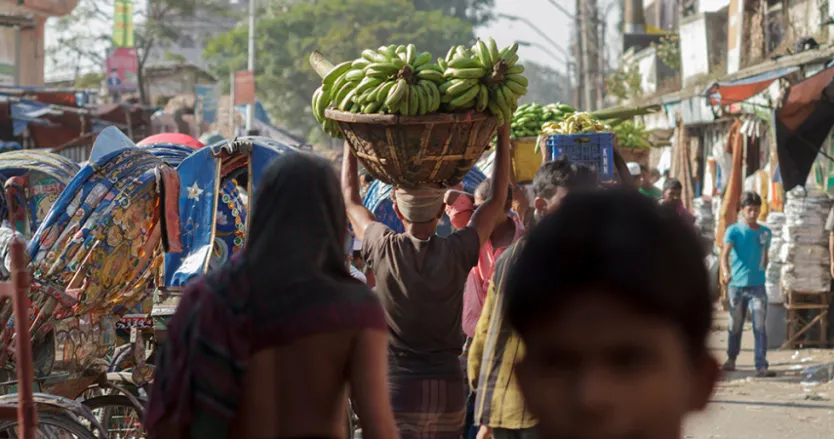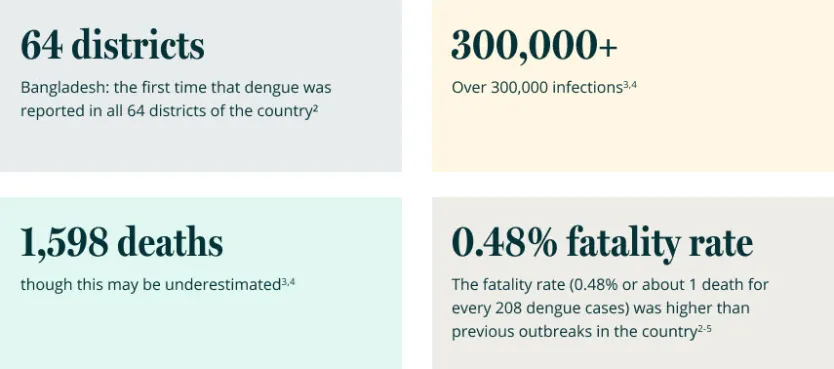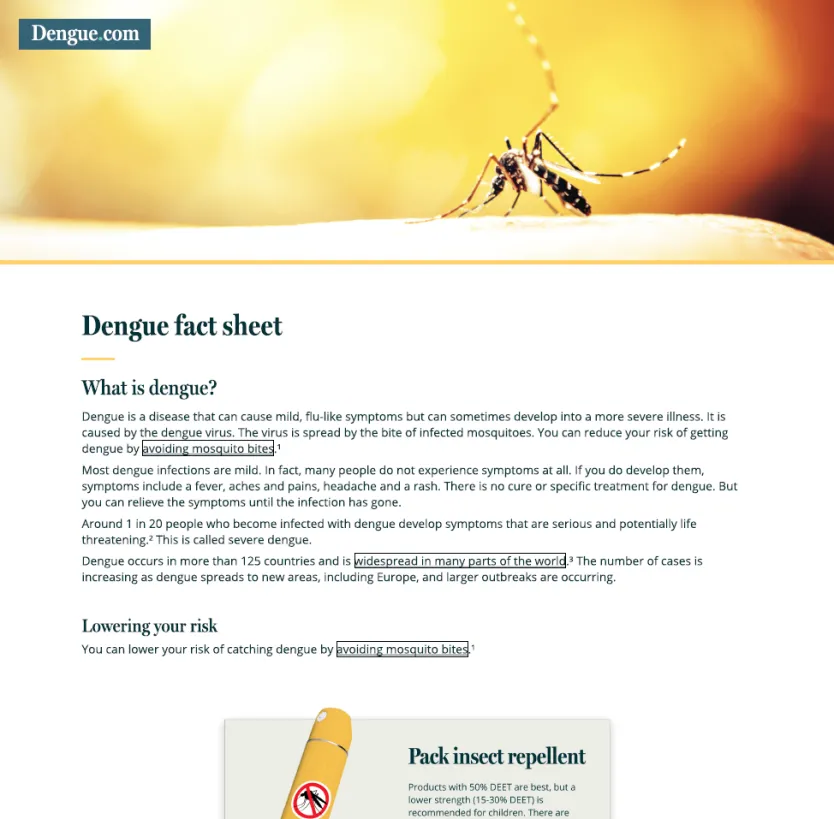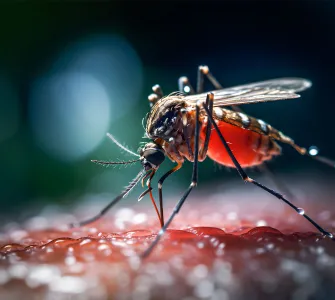Bangladesh 2023 dengue outbreak


More people in Bangladesh died of dengue in 2023 than over the last 22 years combined in an outbreak that extended further across the country than any other before.1,2
Let’s uncover more about the specific details of this outbreak – which was Bangladesh's deadliest recorded to date – and the factors that contributed to it…2

Where
Bangladesh: the first time that dengue was reported in all 64 districts of the country2
The numbers as reported in December 2023
Over 300,000 infections, 1,598 deaths – though this may be underestimated3,4
The fatality rate (0.48% or about 1 death for every 208 dengue cases) was higher than previous outbreaks in the country2-5
The contributing causes
Higher than usual rainfall from a longer monsoon season and rising temperatures due to climate change2,6
Unusually high numbers of dengue carrying Aedes mosquitoes (more rain can mean more stagnant water for mosquitoes to breed in and the higher temperatures helped them develop faster)6,7
“This year the rains came early, and so did dengue.”
– Dr Mohammad Shafiul Alam, scientist in the infectious diseases unit at a Dhaka health research center4
The impact
Hospitals in Bangladesh were overflowing with patients while dealing with a shortage of intravenous fluids, crucial for treating the less common, severe cases8
Hospital beds full; left patients to sleep on the floor or return home to self-treat2,4
Shortage of basic medical supplies, such as injectable blood bags, testing kits and saline9
Patients with other serious illnesses were dying as over-burdened hospitals struggled to provide them critical support10
“I had to deal with two dengue patients, my sister and my niece. I didn't find proper beds for them in the hospital. So, I had to treat them at home.”
– Dhaka resident1
The response
The Ministry of Health arranged extra beds in state-run hospitals in Dhaka10
Hospitals across the country were repurposed to care for dengue patients11
The government coordinated the removal of breeding sites and spraying of insecticide10,11
It also ran various awareness campaigns11
Through UNICEF, religious leaders worked with the Islamic Foundation to help empower communities with information12
The government requested international help for the supply of test kits, fluids, and laboratory equipment to help detect and manage dengue9
Despite the government’s response, it faced criticism by some over its response with questions as to if a more long-term plan and approach against dengue was needed4,10,11
Looking ahead
Some experts felt more training could be provided to healthcare professionals on how to diagnose and treat dengue13
Effective community engagement involving mosques (since Bangladesh is a largely Muslim society, mosques play a role in influencing the community), as well as powerful surveillance systems to monitor mosquitoes could help better manage outbreaks14
Vaccines are an effective way to control infectious diseases. There may be a demand for vaccines to protect against dengue in Bangladesh (though they are not yet available in the country): a study found that a high proportion of people would, in principle, accept a low-cost dengue vaccine with a favorable efficacy profile15
References
BBC. Available at: https://www.bbc.co.uk/news/world-asia-66944315 Accessed December 2023.
Reuters. Available at: https://www.reuters.com/world/asia-pacific/rising-temperatures-longer-monsoon-drive-bangladeshs-worst-dengue-outbreak-2023-11-13/ Accessed December 2023.
Save the Children. Available at: https://www.savethechildren.net/news/dengue-fever-least-5-million-cases-and-5500-deaths-horror-year Accessed December 2023.
Telegraph. Available at: https://www.telegraph.co.uk/global-health/science-and-disease/bangladesh-hospitals-at-breaking-point-in-dengue-crisis/ Accessed December 2023.
UNICEF. Available at: https://www.unicef.org/media/150136/file/Bangladesh%20Humanitarian%20Situation%20Report%20No.%206%20(Dengue%20Outbreak)%2015%20December%202023.pdf Accessed January 2024.
World Health Organization. Available at: https://www.who.int/emergencies/disease-outbreak-news/item/2023-DON481 Accessed December 2023.
Khezzani B, et al. Pan Afr Med J. 2023. 44:70.
Reuters. Available at: https://www.reuters.com/pictures/climate-change-drives-bangladeshs-worst-dengue-outbreak-2023-11-14/ Accessed December 2023.
World Health Organization. Available at: https://cdn.who.int/media/docs/default-source/searo/bangladesh/dengue-sitrep/dengue-sitrep-issue-1.pdf?sfvrsn=6787cd6f_1&download=true Accessed December 2023.
Independent. Available at: https://www.independent.co.uk/news/ap-dhaka-bangladesh-people-asian-b2391351.html Accessed December 2023.
UNICEF. Available at: https://www.unicef.org/bangladesh/en/stories/roundtable-discussion-dengue-response-uniting-efforts-resilient-future Accessed December 2023.
UNICEF. Available at: https://www.unicef.org/bangladesh/en/stories/eleven-year-old-fahim-fights-against-deadly-dengue Accessed December 2023.
Save The Children. Available at: https://www.savethechildren.org.uk/news/media-centre/press-releases/children-die-from-dengue-in-bangladesh- Accessed December 2023.
Hossain MS, et al. Trop Med Health. 2023;51(1):37.
Kabir KMA, et al. Hum Vaccin Immunother. 2021;17(3):773-784.


























